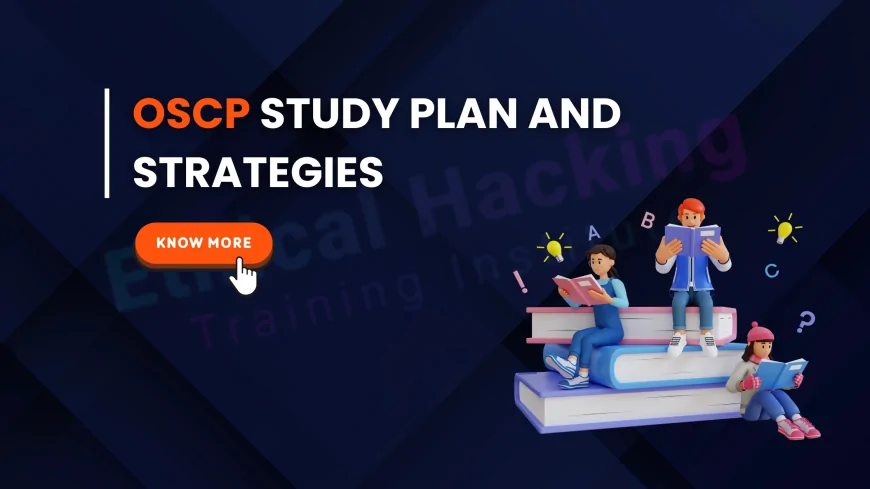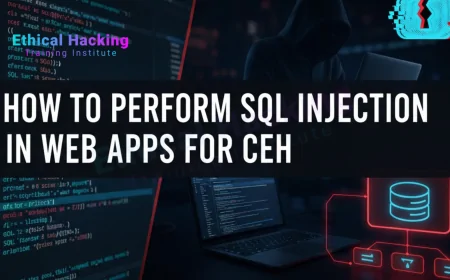Best Way to Study for OSCP in 2025 | Proven Strategies & Study Plan
Discover the most effective ways to study for OSCP in 2025. Learn expert tips, hands-on tools, timeline strategies, and how to master the PEN-200 course. A must-read for aspiring ethical hackers.

Table of Contents
- Why Is OSCP Considered Difficult?
- 1. Understand the OSCP Exam Structure
- 2. Follow the Official PEN-200 Curriculum First
- 3. Build a 60- or 90-Day Study Plan
- 4. Use Additional Practice Platforms
- 5. Master Buffer Overflow Early
- 6. Take Notes with Tools Like Obsidian or CherryTree
- 7. Learn Report Writing from Day One
- 8. Get Comfortable with OSCP Tools
- 9. Join OSCP Communities for Peer Learning
- 10. Simulate Full Mock Exams
- Bonus Tip: Rest and Sleep Before the Exam
- Conclusion
- Frequently Asked Questions (FAQs)
The Offensive Security Certified Professional (OSCP) exam is one of the most respected certifications in ethical hacking and penetration testing. Known for its real-world simulation and practical, hands-on exam format, the OSCP can be challenging even for experienced security professionals.
If you're wondering how to prepare effectively for OSCP, this guide shares the best study strategies, tools, and timelines based on expert advice, successful candidates, and industry best practices.
Why Is OSCP Considered Difficult?
Before we explore strategies, it’s essential to understand why OSCP is hard:
-
A 24-hour hands-on exam with real-world penetration testing challenges
-
No hints or walkthroughs—you’re on your own
-
A lab environment requiring deep technical skills
-
Report writing is mandatory for passing
This difficulty is also what makes the OSCP respected.
1. Understand the OSCP Exam Structure
The OSCP exam consists of:
-
5 machines to exploit within 24 hours
-
You need 70 points out of 100 to pass
-
A detailed penetration test report submitted within 24 hours post-exam
Familiarity with Active Directory, buffer overflows, privilege escalation, and post-exploitation is crucial.
2. Follow the Official PEN-200 Curriculum First
The best starting point is the PEN-200 course offered by Offensive Security, which includes:
-
Video tutorials
-
PDF study materials
-
Access to the OSCP labs
-
Sample exam environments
Tip: Don't skip exercises or lab reports. They help with bonus points.
3. Build a 60- or 90-Day Study Plan
A structured timeline helps pace your study. Here’s a 30-day plan for advanced learners and a 90-day one for beginners:
30-Day Intensive Plan:
-
Week 1–2: Complete all PEN-200 theory + 10 labs
-
Week 3: Focus on buffer overflow, privilege escalation, AD labs
-
Week 4: Simulate a mock exam (5 machines, 24 hours)
90-Day Steady Plan:
-
Month 1: Basics + 20 labs
-
Month 2: Advanced topics + AD + enumeration
-
Month 3: Mock tests + write reports + review weak areas
4. Use Additional Practice Platforms
While the official labs are great, supplement with these:
-
Hack The Box (HTB)
-
TryHackMe
-
VulnHub
-
Proving Grounds by Offensive Security
Practice post-exploitation and privilege escalation on diverse OS types.
5. Master Buffer Overflow Early
Buffer overflow is a required section in the OSCP exam. Learn:
-
Stack-based overflow
-
EIP control
-
NOP sleds
-
Writing your own exploit
Use resources like:
-
Corelan tutorials
-
Skid's buffer overflow series
6. Take Notes with Tools Like Obsidian or CherryTree
Effective OSCP prep includes documenting:
-
Each box
-
Enumeration steps
-
Exploit paths
-
Privilege escalation techniques
You’ll need to replicate this in the exam and the report, so get into the habit early.
7. Learn Report Writing from Day One
The report is mandatory. Even if you root all boxes, poor reporting = fail.
Use templates, write structured steps, include screenshots, and cover your full process for each machine.
8. Get Comfortable with OSCP Tools
Familiarity with common tools can save hours:
-
Nmap, Nikto, Gobuster
-
Burp Suite, sqlmap
-
Netcat, Metasploit
-
LinPEAS, WinPEAS, BloodHound
But remember—manual exploitation is key. Don’t over-rely on Metasploit.
9. Join OSCP Communities for Peer Learning
Engage with OSCP aspirants on:
-
Reddit’s /r/oscp
-
Discord channels
-
Ethical hacking forums
Sharing tactics and debriefing boxes helps develop your red teaming mindset.
10. Simulate Full Mock Exams
Don’t wait for exam day to test your readiness. Do at least:
-
Two 24-hour exam simulations
-
Include report writing under time pressure
-
Try to root 3-5 boxes within 20 hours
This boosts stamina, confidence, and time management.
Bonus Tip: Rest and Sleep Before the Exam
This is a 24-hour marathon. Lack of sleep can tank your performance.
Prepare your workspace, snacks, caffeine, and schedule breaks to avoid burnout.
Conclusion: Consistency Over Speed
You don’t need to be a genius to pass OSCP. You need:
-
Discipline
-
Problem-solving mindset
-
Hands-on practice
It’s not just a test of skills—it’s a test of methodical thinking and persistence. If you study with the right tools and a focused mindset, you will pass.
FAQ:
What is the best way to study for the OSCP exam?
The best approach is a structured study plan combining the PEN-200 course, hands-on labs, daily practice on platforms like Hack The Box, and frequent reviews of difficult topics like buffer overflows and privilege escalation.
How long should I prepare for OSCP?
Most candidates take 2 to 4 months to prepare, studying 2–4 hours daily. However, with full-time focus, you can prepare in 30–45 days using an intensive plan.
Can a beginner pass OSCP with proper preparation?
Yes, beginners can pass OSCP if they commit to consistent practice, master the basics of Linux, networking, and scripting, and complete the entire PEN-200 syllabus.
What are the most effective OSCP study tools?
Top tools include Hack The Box, TryHackMe, VulnHub, Exploit-DB, and platforms like OverTheWire. Tools like Nmap, Burp Suite, and Python scripting are essential.
Is the PEN-200 course enough to pass the OSCP?
Yes, but success also depends on how well you internalize the content, complete the labs, and review the exercises. Additional CTF practice is recommended.
How many labs should I complete in OSCP?
It’s recommended to complete at least 40–50 lab machines in PEN-200, focusing on different techniques (enumeration, exploitation, escalation).
Should I learn buffer overflow separately for OSCP?
Yes. Buffer overflows are a key exam component. Learn manually exploiting a BOF in Windows XP or similar environments to solidify your skills.
What are the best websites to practice for OSCP?
Hack The Box, TryHackMe (Offensive Pentesting Path), and VulnHub offer excellent OSCP-like challenges. Focus on retired OSCP-like machines.
How do I structure my OSCP study plan?
Divide your time into phases: Week 1–2 (theory & basic tools), Week 3–6 (labs), Week 7 (review), and Week 8 (mock exam & report writing).
What is the role of report writing in OSCP?
The OSCP exam requires a professional pentest report. Practice writing detailed, reproducible steps, screenshots, and post-exploitation notes.
How important is time management in the OSCP exam?
Crucial. The 24-hour exam is time-bound. Practice mock exams under timed conditions to simulate real pressure and improve speed.
Can I use Metasploit in OSCP?
Only in specific sections. For the exam, Metasploit is restricted to one machine. Learning manual exploitation is key.
What tools should I master for OSCP?
Must-know tools include Nmap, Netcat, Nikto, Burp Suite, Gobuster, LinPEAS, Enum4linux, and custom scripts in Bash or Python.
Are Hack The Box and TryHackMe useful for OSCP?
Yes. They provide OSCP-style challenges and help build confidence with real-world exploitation scenarios.
How can I simulate the OSCP exam environment?
Use HTB’s Pro Labs, VulnHub VMs, or set up a local environment with multiple vulnerable machines and limit yourself to OSCP toolsets.
What common mistakes do OSCP candidates make?
Relying too much on Metasploit, skipping note-taking, poor time management, and lack of hands-on lab practice are common pitfalls.
How do I prepare for privilege escalation in OSCP?
Use tools like LinEnum, LinPEAS, WinPEAS, and practice CTFs focused on misconfigurations, cron jobs, and kernel exploits.
What should my OSCP notes include?
Commands, exploitation steps, screenshots, IPs, flags, and post-exploitation techniques should be organized and searchable.
Is 30 days enough to prepare for OSCP?
Yes, but only with intensive study (4–6 hours daily), strong foundational knowledge, and aggressive lab practice.
Can I work full-time while studying for OSCP?
It’s possible with a well-structured evening and weekend schedule, though it may require a longer study timeline (3–5 months).
What is the best way to retain OSCP concepts?
Teach others, write blog posts, summarize key concepts, and revisit topics weekly to reinforce memory.
Are video courses helpful for OSCP prep?
Yes, platforms like TCM Security, IppSec’s HTB videos, and John Hammond tutorials can greatly complement your OSCP studies.
How do I troubleshoot when stuck in OSCP labs?
Reread enumeration output, check logs, research CVEs carefully, and avoid rushing. Ask peers in forums or communities if you're blocked too long.
What topics should I revise before the OSCP exam?
Focus on enumeration, buffer overflows, privilege escalation, and post-exploitation. Revisit failed lab machines.
How do I write a professional OSCP report?
Follow the Offensive Security report template. Use clear headings, step-by-step exploits, screenshots, and remediation suggestions.
Do I need programming skills for OSCP?
Basic knowledge of Python, Bash, and PowerShell is very helpful for scripting, automation, and modifying exploits.
How can I test my OSCP readiness?
Attempt an OSCP-style mock exam: 5 machines in 24 hours with scoring requirements. Also, simulate writing a report.
What’s the best time to book the OSCP exam?
Schedule it 1–2 weeks after finishing your labs and mock tests. Choose a time slot when you’re most alert and least distracted.
Should I use public walkthroughs during OSCP prep?
Use them only after thorough attempts. Walkthroughs are great learning tools but can hinder your problem-solving skills if overused.
How do I stay motivated during OSCP training?
Track your progress visually, set weekly goals, join Discord study groups, and celebrate small wins like rooted machines.
What's Your Reaction?
 Like
0
Like
0
 Dislike
0
Dislike
0
 Love
0
Love
0
 Funny
0
Funny
0
 Angry
0
Angry
0
 Sad
0
Sad
0
 Wow
0
Wow
0


















